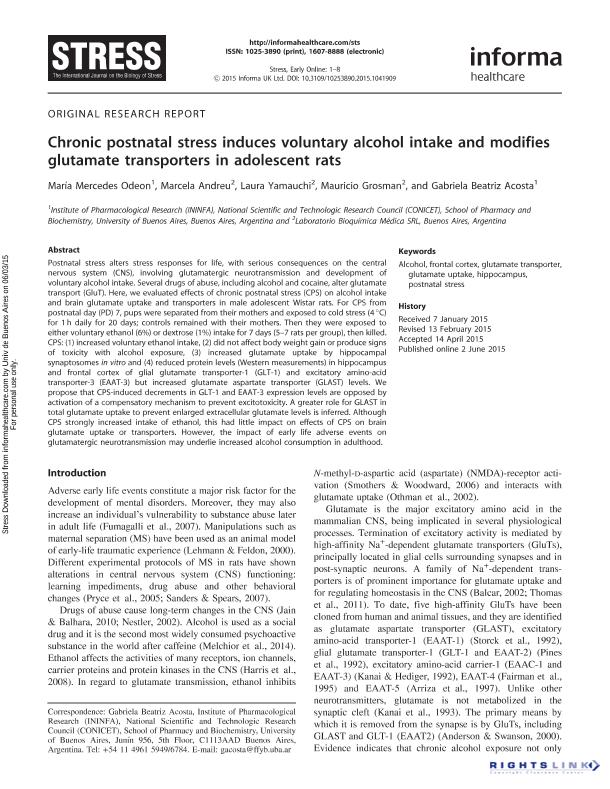Artículo
Chronic postnatal stress induces voluntary alcohol intake and modifies glutamate transporters in adolescent rats
Odeon, Maria Mercedes ; Andreu, Marcela; Yamauchi, Laura; Grosman, Mauricio; Acosta, Gabriela Beatriz
; Andreu, Marcela; Yamauchi, Laura; Grosman, Mauricio; Acosta, Gabriela Beatriz
 ; Andreu, Marcela; Yamauchi, Laura; Grosman, Mauricio; Acosta, Gabriela Beatriz
; Andreu, Marcela; Yamauchi, Laura; Grosman, Mauricio; Acosta, Gabriela Beatriz
Fecha de publicación:
06/2015
Editorial:
Taylor & Francis
Revista:
Stress
ISSN:
1025-3890
e-ISSN:
1607-8888
Idioma:
Inglés
Tipo de recurso:
Artículo publicado
Clasificación temática:
Resumen
Postnatal stress alters stress responses for life, with serious consequences on the central nervous system (CNS), involving glutamatergic neurotransmission and development of alcohol voluntary intake. Several drugs of abuse, including alcohol and cocaine, alter glutamate transport (GluT). Here, we evaluated effects of chronic postnatal stress (CPS) on alcohol intake and brain glutamate uptake and transporters in male adolescent Wistar rats. For CPS from postnatal day (PD) 7, the pups were separated from their mothers and exposed to cold stress (4ºC) for 1h during 20 days; controls remained with their mothers. Then they were exposed to either voluntary ethanol (6%) or dextrose (1%) intake for 7 days (5-7 rats per group), then killed. CPS: 1) increased voluntary ethanol intake; 2) did not affect body weight gain or produce signs of toxicity with alcohol exposure; 3) increased glutamate uptake by hippocampal synaptosomes in vitro 4) reduced protein levels (Western measurements) in hippocampus and frontal cortex of glial glutamate transporter-1 (GLT-1) and excitatory amino-acid transporter-3 (EAAT-3) but increased glutamate aspartate transporter (GLAST) levels. We propose that CPS-induced decrements in GLT-1 and EAAT-3 expression levels are opposed by activation of a compensatory mechanism to prevent excitotoxicity. A greater role for GLAST in total glutamate uptake to put a stop to enlarged extracellular glutamate levels is inferred. The results also demonstrate that CPS strongly increased intake of ethanol, which had little impact on effects of CPS on brain glutamate uptake or transporters. However, the impact of early life adverse events on glutamatergic neurotransmission may underlie increased alcohol consumption in adulthood.
Archivos asociados
Licencia
Identificadores
Colecciones
Articulos(ININFA)
Articulos de INST.DE INVEST.FARMACOLOGICAS (I)
Articulos de INST.DE INVEST.FARMACOLOGICAS (I)
Articulos(SEDE CENTRAL)
Articulos de SEDE CENTRAL
Articulos de SEDE CENTRAL
Citación
Odeon, Maria Mercedes; Andreu, Marcela; Yamauchi, Laura; Grosman, Mauricio; Acosta, Gabriela Beatriz; Chronic postnatal stress induces voluntary alcohol intake and modifies glutamate transporters in adolescent rats; Taylor & Francis; Stress; 2; 6-2015; 1-8
Compartir
Altmétricas



